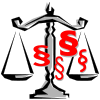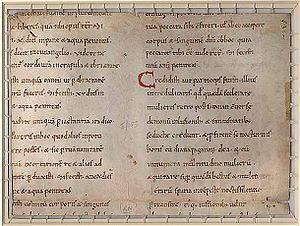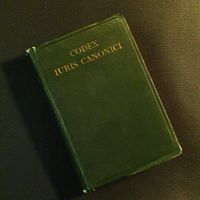- Canon law
-
Canon law is the body of laws & regulations made or adopted by ecclesiastical authority, for the government of the Christian organization and its members. It is the internal ecclesiastical law governing the Catholic Church (both Latin Rite and Eastern Catholic Churches), the Eastern and Oriental Orthodox churches, and the Anglican Communion of churches.[1] The way that such church law is legislated, interpreted and at times adjudicated varies widely among these three bodies of churches. In all three traditions, a canon was originally a rule adopted by a council; these canons formed the foundation of canon law.
Contents
Etymology
Greek kanon / κανών, Arabic Qanon / قانون, Hebrew kaneh / קנה, "straight"; a rule, code, standard, or measure; the root meaning in all these languages, including Latin, is "reed."
Canons of the Apostles
Main article: Canons of the ApostlesThe Apostolic Canons[2] or Ecclesiastical Canons of the Same Holy Apostles[3] is a collection of ancient ecclesiastical decrees (eighty-five in the Eastern, fifty in the Western Church) concerning the government and discipline of the Early Christian Church, incorporated with the Apostolic Constitutions which are part of the Ante-Nicene Fathers
Catholic Church

This article is part of a series on the
Law of the Catholic ChurchCodes of Canon Law
- 1983 Code of Canon Law
- Code of Canons of the Eastern Churches
- 1917 Code of Canon Law
- Concordance of Discordant Canons
- Decretals of Gregory IX
- Anglicanorum Coetibus
- Benedictus Deus
- Ex Corde Ecclesiae
- Fidei Depositum
- Indulgentiarum Doctrina
- Pastor Bonus
- Providentissima Mater Ecclesia
- Sacrae Disciplinae Leges
- Ut Sit (see also Opus Dei)
- Universi Dominici Gregis
Canon Law of Vatican II
Other
- Canon 915
- Latae Sententiae Excommunication
- Motu Proprio
· WikiProject Canon Law
Main article: Canon law (Catholic Church)The Catholic Church has what is claimed to be the oldest continuously functioning internal legal system in Western Europe,[4][unreliable source?] much later than Roman law but predating evolution of modern European civil law traditions. What began with rules ("canons") adopted by the Apostles at the Council of Jerusalem in the first century has developed into a highly complex legal system encapsulating not just norms of the New Testament, but some elements of the Hebrew (Old Testament), Roman, Visigothic, Saxon, and Celtic legal traditions.
In the Roman Church, positive ecclesiastical laws, based upon either immutable divine and natural law, or changeable circumstantial and merely positive law, derive formal authority and promulgation from the office of pope, who as Supreme Pontiff possesses the totality of legislative, executive, and judicial power in his person.[5] The actual subject material of the canons is not just doctrinal or moral in nature, but indeed all-encompassing of the human condition.
In the early Church, the first canons were decreed by bishops united in "Ecumenical" councils (the Emperor summoning all of the known world's bishops to attend with at least the acknowledgement of the Bishop of Rome) or "local" councils (bishops of a region or territory). Over time, these canons were supplemented with decretals of the Bishops of Rome, which were responses to doubts or problems according to the maxim, "Roma locuta est, causa finita est" ("Rome has spoken, case is closed").
Later, they were gathered together into collections, both unofficial and official. The first truly systematic collection was assembled by the Camaldolese monk Gratian in the 11th century, commonly known as the Decretum Gratiani ("Gratian's Decree"). Pope Gregory IX is credited with promulgating the first official collection of canons called the Decretalia Gregorii Noni or Liber Extra (1234). This was followed by the Liber Sextus (1298) of Boniface VIII, the Clementines (1317) of Clement V, the Extravagantes Joannis XXII and the Extravagantes Communes, all of which followed the same structure as the Liber Extra. All these collections, with the Decretum Gratiani, are together referred to as the Corpus Juris Canonici. After the completion of the Corpus Juris Canonici, subsequent papal legislation was published in periodic volumes called Bullaria.
By the 19th Century, this body of legislation included some 10,000 norms. Many these were difficult to reconcile with one another due to changes in circumstances and practice. This situation impelled Pope St. Pius X to order the creation of the first Code of Canon Law, a single volume of clearly stated laws. Under the aegis of the Cardinal Pietro Gasparri, the Commission for the Codification of Canon Law was completed under Benedict XV, who promulgated the Code, effective in 1918. The work having been begun by Pius X, it was sometimes called the "Pio-Benedictine Code" but more often the 1917 Code. In its preparation, centuries of material was examined, scrutinized for authenticity by leading experts, and harmonized as much as possible with opposing canons and even other codes, from the Codex of Justinian to the Napoleonic Code.
Pope John XXIII initially called for a Synod of the Diocese of Rome, an Ecumenical Council, and an updating to the 1917 Code. After the Second Ecumenical Council of the Vatican (Vatican II) closed in 1965, it became apparent that the Code would need to be revised in light of the documents and theology of Vatican II. After multiple drafts and many years of discussion, Pope John Paul II promulgated the revised Code of Canon Law (CIC) in 1983. Containing 1752 canons, it is the law currently binding on the Latin (western) Roman Church.
The canon law of the Eastern Catholic Churches, which had developed some different disciplines and practices, underwent its own process of codification, resulting in the Code of Canons of the Eastern Churches promulgated in 1990 by Pope John Paul II.[citation needed] The institutions and practices of canon law paralleled the legal development of much of Europe, and consequently both modern civil law and common law bear the influences of canon law. Edson Luiz Sampel, a Brazilian expert in canon law, says that canon law is contained in the genesis of various institutes of civil law, such as the law in continental Europe and Latin American countries. Sampel explains that canon law has significant influence in contemporary society.[citation needed]
Currently, all Latin-Rite Catholic seminary students are expected to take courses in canon law (c. 252.3). Some ecclesiastical officials are required to have the doctorate (JCD) or at least the licentiate (JCL) in canon law in order to fulfill their functions: judicial vicars (c. 1419.1), judges (c. 1421.3), promoters of justice (c. 1435), defenders of the bond (c. 1435). In addition, vicars general and episcopal vicars are to be doctors or at least licensed in canon law or theology (c. 478.1), and canonical advocates must either have the doctorate or be truly expert in canon law (c. 1483). Ordinarily, bishops are to have advanced degrees in sacred scripture, theology, or canon law (c. 378.1.5). St. Raymond of Penyafort (1175–1275), a Spanish Dominican priest, is the patron saint of canonists, due to his important contributions to the science of canon law.
Canon law faculties and institutes
Number University Name of entity City Country 1 Catholic University of Central Africa Autonomous Department of Canon Law Yaoundé  Cameroon
Cameroon2 Saint Paul University Faculty of Canon Law Ottawa  Canada
Canada3 Pontifical University of Mexico Faculty of Canon Law Mexico City  Mexico
Mexico4 The Catholic University of America School of Canon Law Washington, D.C.  USA
USA5 Pontifical Catholic University of Argentina Faculty of Canon Law of Saint Turibius of Mongrovejo Buenos Aires  Argentina
Argentina6 Pontifical Institute of Canon Law Pontifical Institute of Canon Law Rio de Janeiro  Brazil
Brazil7 Pontifical Faculty of Theology of Our Lady of the Assumption Institute of Canon Law of Fr Dr. Giuseppe Benito Pegoraro São Paulo  Brazil
Brazil8 Pontifical Xavierian University Faculty of Canon Law Bogotà  Colombia
Colombia9 St. Peter's Pontifical Institute of Theology Centre of Canon Law Studies Bangalore  India
India10 Dharmaram Vidya Kshetram Institute of Oriental Canon Law Bangalore  India
India11 University of Santo Tomas Faculty of Canon Law Manila  Philippines
Philippines12 Katholieke Universiteit Leuven Faculty of Canon Law Leuven  Belgium
Belgium13 Université catholique de Louvain Faculty of Canon Law Louvain-la-Neuve  Belgium
Belgium14 Institut Catholique de Paris Faculty of Canon Law Paris  France
France15 University of Strasbourg Institute of Canon Law Strasbourg  France
France16 Catholic University of Toulouse Faculty of Canon Law Toulouse  France
France17 Ludwig Maximilian University of Munich Institute of Canon Law of Klaus Mörsdorf Munich  Germany
Germany18 University of Münster Faculty of Canon Law Münster  Germany
Germany19 Pázmány Péter Catholic University Institute of Canon Law Budapest  Hungary
Hungary20 St Patrick's College Faculty of Canon Law Maynooth  Ireland
Ireland21 Pontifical Gregorian University Faculty of Canon Law Vatican city  Vatican City
Vatican City22 Pontifical Lateran University Faculty of Canon Law Vatican city  Vatican City
Vatican City23 Pontifical University of Saint Thomas Aquinas Faculty of Canon Law Rome  Italy
Italy24 Pontifical University Antonianum Faculty of Canon Law Rome  Italy
Italy25 Pontifical Urbaniana University Faculty of Canon Law Vatican city  Vatican City
Vatican City26 Salesian Pontifical University Faculty of Canon Law Rome  Italy
Italy27 Pontifical Oriental Institute Faculty of Oriental Canon Law Vatican city  Vatican City
Vatican City28 Pontifical University of the Holy Cross Faculty of Canon Law Vatican city  Vatican City
Vatican City29 Studium Generale Marcianum Faculty of Canon Law of St Pius X Venice  Italy
Italy30 Pontifical University of John Paul II Institute of Canon Law Cracow  Poland
Poland31 John Paul II Catholic University of Lublin Faculty of Law, Canon Law and Administration Lublin  Poland
Poland32 Cardinal Stefan Wyszyński University in Warsaw Faculty of Canon Law Warsaw  Poland
Poland33 Catholic University of Portugal Institute of Canon Law Lisbon  Portugal
Portugal34 Comillas Pontifical University Faculty of Canon Law Madrid  Spain
Spain35 Ecclesiastical University St Damasus Faculty of Canon Law Madrid  Spain
Spain36 University of Navarre Faculty of Canon Law Pamplona  Spain
Spain37 Pontifical University of Salamanca Faculty of Canon Law Salamanca  Spain
SpainOrthodox Churches
The Greek-speaking Orthodox have collected canons and commentaries upon them in a work known as the Pēdálion (Greek: Πηδάλιον, "Rudder"), so named because it is meant to "steer" the Church. The Orthodox Christian tradition in general treats its canons more as guidelines than as laws, the bishops adjusting them to cultural and other local circumstances. Some Orthodox canon scholars point out that, had the Ecumenical Councils (which deliberated in Greek) meant for the canons to be used as laws, they would have called them nómoi/νόμοι (laws) rather than kanónes/κανόνες (rules), but almost all Orthodox conform to them. The dogmatic decisions of the Councils, though, are to be obeyed rather than to be treated as guidelines, since they are essential for the Church's unity.
Anglican Communion
Main article: Canon law (Anglican Communion)In the Church of England, the ecclesiastical courts that formerly decided many matters such as disputes relating to marriage, divorce, wills, and defamation, still have jurisdiction of certain church-related matters (e.g., discipline of clergy, alteration of church property, and issues related to churchyards). Their separate status dates back to the 12th century when the Normans split them off from the mixed secular/religious county and local courts used by the Saxons. In contrast to the other courts of England the law used in ecclesiastical matters is at least partially a civil law system, not common law, although heavily governed by parliamentary statutes. Since the Reformation, ecclesiastical courts in England have been royal courts. The teaching of canon law at the Universities of Oxford and Cambridge was abrogated by Henry VIII; thereafter practitioners in the ecclesiastical courts were trained in civil law, receiving a Doctor of Civil Law (D.C.L.) degree from Oxford, or an LL.D. from Cambridge. Such lawyers (called "doctors" and "civilians") were centred at "Doctors Commons", a few streets south of St Paul's Cathedral in London, where they monopolized probate, matrimonial, and admiralty cases until their jurisdiction was removed to the common law courts in the mid-19th century. (Admiralty law was also based on civil law instead of common law, thus was handled by the civilians too.)[citation needed] Charles I repealed canon law in 1638 after uprisings of Covenanters confronting the Bishops of Aberdeen following the convention at Muchalls Castle and other revolts across Scotland earlier that year.[citation needed]
Other churches in the Anglican Communion around the world (e.g., the Episcopal Church in the United States, and the Anglican Church of Canada) still function under their own private systems of canon law.
Presbyterian and Reformed churches
Main article: Presbyterian polityIn Presbyterian and Reformed churches, canon law is known as "practice and procedure" or "church order," and includes the church's laws respecting its government, discipline, legal practice and worship.
Lutheranism
The Book of Concord is the historic doctrinal statement of the Lutheran Church, consisting of ten credal documents recognized as authoritative in Lutheranism since the 16th century.[6] However, the Book of Concord is a confessional document (stating orthodox belief) rather than a book of ecclesiastical rules or discipline, like canon law. Each Lutheran national church establishes its own system of church order and discipline, though these are referred to as "canons."
The United Methodist Church
The Book of Discipline contains the laws, rules, policies and guidelines for The United Methodist Church. Its last edition was published in 2008.
See also
- Canon law (Catholic Church)
- Abrogation of Old Covenant laws
- Canon law (Church of England)
- Canon law (Episcopal Church in the United States)
- Canons of Dort
- Canons of the Apostles
- Chronological list of canon lawyers
- Collections of Ancient Canons
- Decretum Gratiani
- Doctor of Canon Law
- Ecclesiastical court
- Fetha Negest
- Gratian (jurist)
- Ius remonstrandi
- Licentiate of Canon Law
- Rule According to Higher Law
- Halacha
- Sharia
References
- ^ "Canon law". Catholic Encyclopedia. http://www.newadvent.org/cathen/09056a.htm. Retrieved 2008-05-26.
- ^ "Catholic Encyclopedia: Apostolic Canons". New Advent. http://www.newadvent.org/cathen/03279a.htm. Retrieved 2008-05-26.
- ^ "The Ecclesiastical Canons of the Same Holy Apostles". Ante-Nicene Fathers, Vol VII. http://www.sacred-texts.com/chr/ecf/007/0070471.htm. Retrieved 2008-05-26.
- ^ Peters E. Canonlaw.info, website of an American lay canon lawyer
- ^ Canon 331, 1983 Code of Canon Law
- ^ F. Bente, ed. and trans., Concordia Triglotta, (St. Louis: Concordia Publishing House, 1921), p. i
Further reading
- Baker, J.H. (2002) An Introduction to English Legal History, 4th ed. London : Butterworths, ISBN 0-406-93053-8
- Brundage, James A., The Medieval Origins of the Legal Profession: Canonists, Civilians, and Courts, Chicago : University of Chicago Press, c2008.
- Brundage, James A., Medieval Canon Law, London ; New York : Longman, 1995.
- The Episcopal Church (2006) Constitution and Canons, together with the Rules of Order for the Government of the Protestant Episcopal Church in the United States of America, otherwise known as The Episcopal Church, New York : Church Publishing, Inc.
- Hartmann, Wilfried and Kenneth Pennington eds. (2008) The History of Medieval Canon Law in the Classical Period, 1140-1234: From Gratian to the Decretals of Pope Gregory IX, Washington D.C.: The Catholic University of America Press.
- Hartmann, Wilfried and Kenneth Penningon eds. (2011) The History of Byzantine and Eastern Canon Law to 1500, Washington D.C.: The Catholic University of America Press.
- R. C. Mortimer, Western Canon Law, London: A. and C. Black, 1953.
- Robinson, O.F.,Fergus, T.D. and Gordon, W.M. (2000) European Legal History, 3rd ed., London : Butterworths, ISBN 0-406-91360-9
External links
Catholic
- Codex Iuris Canonici (1983), original text in Latin (the only official text)
- Code of Canon Law (1983) but with the 1998 modification of canons 750 and 1371, English translation by the Canon Law Society of America, on the Vatican website
- Code of Canon Law (1983), English translation by the Canon Law Society of Great Britain and Ireland, assisted by the Canon Law Society of Australia and New Zealand and the Canadian Canon Law Society
- Codex canonum ecclesiarum orientalium (1990), original text in Latin
- "Code of canons of Oriental Churchs" (1990), defective English translation
- Codex Iuris Canonici (1917), original text in Latin
- Catholic Encyclopedia: Canon Law: outdated, but useful
- Salvific Law
- 1983 Code of Canon Law - Notes, Commentary, Articles, Bibliography
Anglican
- "Canons of the Church of England"
- "Canon Law in the Anglican Communion"
- "Canon Law in the Episcopal Church in the US"
- "Ecclesiastical Law Society"
Law Core subjects 
Other subjects Abusive language · Admiralty law · Aviation law · Banking law · Bankruptcy · Commercial law · Competition law · Conflict of laws · Consumer protection · Corporate law · Energy law · Entertainment law · Environmental law · Family law · Financial regulation · Human rights · Immigration law · Intellectual property · International criminal law · Labour law · Military law · Music law · Procedure (Civil · Criminal) · Product liability · Space law · Sports law · Tax law · Unjust enrichment · WillsLegal systems Canon law · Civil law · Common law · Chinese law · Halakha · Roman law · Sharia · Socialist law · Statutory law · XeerLegal theory Critical legal studies · Comparative law · Economic analysis · History · International legal theory · Philosophy · SociologyLegal institutions Categories:- Canon law
- Christian law
- Christian terms
Wikimedia Foundation. 2010.


